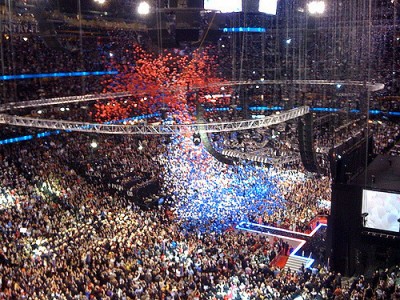With the Republican National Convention still freshly branded into our brains and the Democratic National Convention beginning to stagger into the media cycle, now is a good time to learn a few things about spectacles. If nominating conventions are anything, they are spectacles. For this we should turn to no one less than Guy Debord and his classic text The Society of the Spectacle.
Debord uses “spectacle” to describe “a social relationship between people that is mediated by images.“ It is important to remember that spectacle can mean a visually rich event or something that you wear over your eyes to change your vision. The society of the spectacle shifts between both: media-saturated events support the creation of lenses with which to see the world. The propaganda of political rallies is not washed away by the balloon drop: it sticks with you long afterward. Throughout The Society of the Spectacle Debord makes reference to real and natural worlds but do not mistake such a distinction for a (digital) dualist conception of the world. Rather, Debord observes:
The spectacle cannot be set in abstract opposition to concrete social activity, for the dichotomy between reality and image will survive on either side of any such distinction. Thus the spectacle, though it turns reality on its head, is itself a product of real activity.
The spectacle is capitalist means of production feeling itself. It is always ready to replace meaningful experiences that we make for each other, with meticulously crafted moments that feel and look bigger and better than what we might have made for ourselves. Like the sweetness of candy compared to a beet from a garden. Debord suggests that a prerequisite for these moments is the destruction of more “real” experiences:
In its most advanced sectors, a highly concentrated capitalism has begun selling “fully equipped” blocks of time, each of which is a complete commodity combining a variety of other commodities. This is the logic behind the appearance, within an expanding economy of “services” and leisure activities, of the “allinclusive” purchase of spectacular forms of housing, of collective pseudotravel, of participation in cultural consumption and even of sociability itself, in the form of “exciting conversations,” “meetings with celebrities” and suchlike. Spectacular commodities of this type could obviously not exist were it not for the increasing impoverishment of the realities they parody. And, not surprisingly, they are also paradigmatic of modern sales techniques in that they may be bought on credit.
This is how we might make sense of the fact that conventions often give plumb speaking slots to celebrities and other folks that hold no office in the party or the government. Celebrities can stand in for a friend or a mentor. They are emotional surrogates as much as anything else.
Conventions also appear to be celebrating something when in fact few people know or care about what is going on, let alone are excited about their outcome. Debord’s “pseudo-festival” might help us understand what is going on here. Like the “real” experience, the conventions make up for the lack of actual celebration-worthy events through sheer force of visibility and manufactured excitement:
Our epoch, which presents its time to itself as essentially made up of many frequently recurring festivities, is actually an epoch without festival. Those moments when, under the reign of cyclical time, the community would participate in a luxurious expenditure of life, are strictly unavailable to a society where neither community nor luxury exists. Mass pseudofestivals, with their travesty of dialogue and their parody of the gift, may incite people to excessive spending, but they produce only a disillusion which is invariably in turn offset by further false promises. The selfapprobation of the time of modern survival can only be reinforced, in the spectacle, by reduction in its use value. The reality of time has been replaced by its publicity.
This last sentence sounds strange but the idea is simple: rather than celebrate the passage of historical time—acknowledging that life itself is defined as a span of time, that all things emerge as a product of time’s passing, and that by the very nature of things the biggest endeavors must be social because they take longer than a single human life—the spectacle requires time be both infinite and dividable into standard segments. The convention schedule, the time slot, and the commercial break are all predicated on the assumption that certain moments must be well seen and others are far less important. Time is divided so that it might be sold and the selling price is pegged to its ability to be seen, its publicity.
As we watch this convention and re-watch the last one (either uncut and pure, or reformulated as more obvious farce) let’s know spectacle when we see it, but also leave room for moments of honest candor. The spectacle is a useful theoretical lens, but it is also important to take it off once in a while. Debord leaves little room for moments where commodified time might be turned back on itself and appropriated for parody or narratives resistant to hegemonic discourse. (Debord sees the spectacle as, itself, a parody of more authentic ways of living.) The conventions are spectacle from gavel to gavel, but humanity always has a way of shining through.
David is on Twitter
Image credit: PBS Newshour

